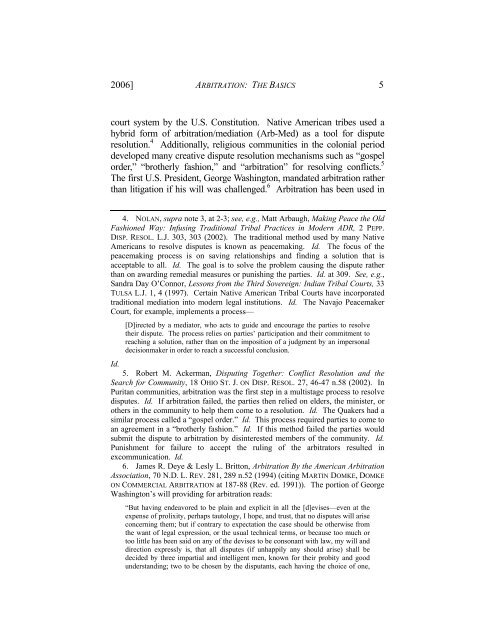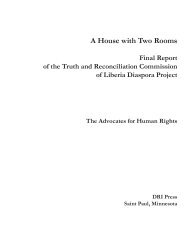2006/Vol. 5 No.1 - Hamline Law - Hamline University
2006/Vol. 5 No.1 - Hamline Law - Hamline University
2006/Vol. 5 No.1 - Hamline Law - Hamline University
You also want an ePaper? Increase the reach of your titles
YUMPU automatically turns print PDFs into web optimized ePapers that Google loves.
<strong>2006</strong>] ARBITRATION: THE BASICS 5<br />
court system by the U.S. Constitution. Native American tribes used a<br />
hybrid form of arbitration/mediation (Arb-Med) as a tool for dispute<br />
resolution. 4 Additionally, religious communities in the colonial period<br />
developed many creative dispute resolution mechanisms such as “gospel<br />
order,” “brotherly fashion,” and “arbitration” for resolving conflicts. 5<br />
The first U.S. President, George Washington, mandated arbitration rather<br />
than litigation if his will was challenged. 6 Arbitration has been used in<br />
4. NOLAN, supra note 3, at 2-3; see, e.g., Matt Arbaugh, Making Peace the Old<br />
Fashioned Way: Infusing Traditional Tribal Practices in Modern ADR, 2 PEPP.<br />
DISP. RESOL. L.J. 303, 303 (2002). The traditional method used by many Native<br />
Americans to resolve disputes is known as peacemaking. Id. The focus of the<br />
peacemaking process is on saving relationships and finding a solution that is<br />
acceptable to all. Id. The goal is to solve the problem causing the dispute rather<br />
than on awarding remedial measures or punishing the parties. Id. at 309. See, e.g.,<br />
Sandra Day O’Connor, Lessons from the Third Sovereign: Indian Tribal Courts, 33<br />
TULSA L.J. 1, 4 (1997). Certain Native American Tribal Courts have incorporated<br />
traditional mediation into modern legal institutions. Id. The Navajo Peacemaker<br />
Court, for example, implements a process—<br />
[D]irected by a mediator, who acts to guide and encourage the parties to resolve<br />
their dispute. The process relies on parties’ participation and their commitment to<br />
reaching a solution, rather than on the imposition of a judgment by an impersonal<br />
decisionmaker in order to reach a successful conclusion.<br />
Id.<br />
5. Robert M. Ackerman, Disputing Together: Conflict Resolution and the<br />
Search for Community, 18 OHIO ST. J. ON DISP. RESOL. 27, 46-47 n.58 (2002). In<br />
Puritan communities, arbitration was the first step in a multistage process to resolve<br />
disputes. Id. If arbitration failed, the parties then relied on elders, the minister, or<br />
others in the community to help them come to a resolution. Id. The Quakers had a<br />
similar process called a “gospel order.” Id. This process required parties to come to<br />
an agreement in a “brotherly fashion.” Id. If this method failed the parties would<br />
submit the dispute to arbitration by disinterested members of the community. Id.<br />
Punishment for failure to accept the ruling of the arbitrators resulted in<br />
excommunication. Id.<br />
6. James R. Deye & Lesly L. Britton, Arbitration By the American Arbitration<br />
Association, 70 N.D. L. REV. 281, 289 n.52 (1994) (citing MARTIN DOMKE, DOMKE<br />
ON COMMERCIAL ARBITRATION at 187-88 (Rev. ed. 1991)). The portion of George<br />
Washington’s will providing for arbitration reads:<br />
“But having endeavored to be plain and explicit in all the [d]evises—even at the<br />
expense of prolixity, perhaps tautology, I hope, and trust, that no disputes will arise<br />
concerning them; but if contrary to expectation the case should be otherwise from<br />
the want of legal expression, or the usual technical terms, or because too much or<br />
too little has been said on any of the devises to be consonant with law, my will and<br />
direction expressly is, that all disputes (if unhappily any should arise) shall be<br />
decided by three impartial and intelligent men, known for their probity and good<br />
understanding; two to be chosen by the disputants, each having the choice of one,
















